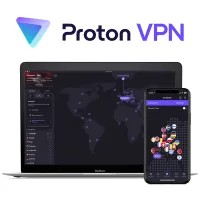The fastest VPN for outright speed in 2025
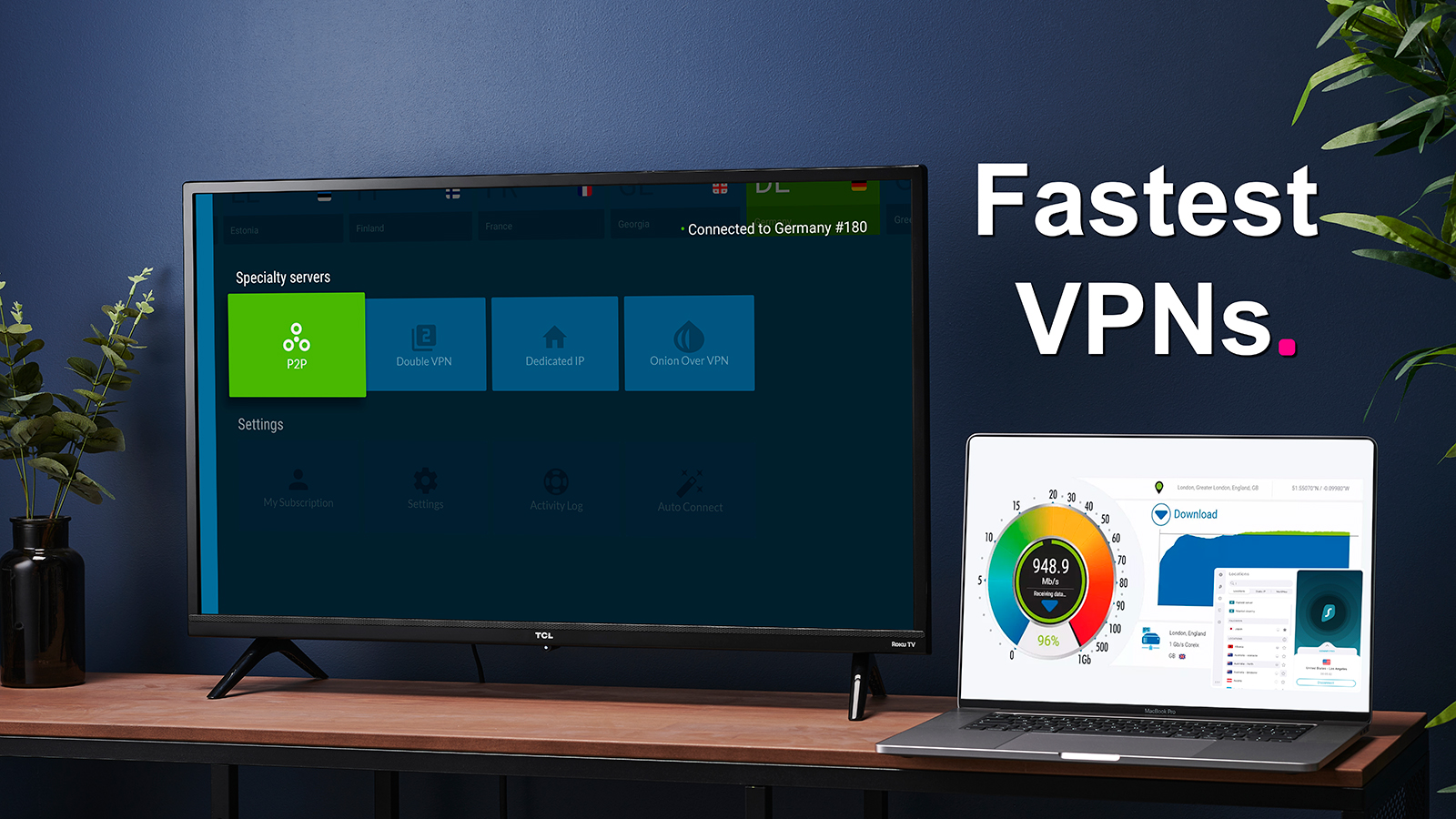
Today's fastest VPNs protect your online privacy without massively impacting your connection speeds, so you won't have to deal with long page load times and stuttering streaming content.
While the best VPNs encrypt the traffic that leaves your device, making it unreadable to third-party snoopers, the extra steps this adds to the connection process could negatively impact your overall speeds. The VPNs we've included in this guide are all more than quick enough to keep up with demanding online activities – think streaming in HD and 4K, gaming, and torrenting.
Surfshark is the best choice overall. The speeds we recorded maxed out our testing connection, ensuring that our streaming sessions weren't interrupted by any buffering issues or choppy audio. NordVPN is a close second, with comparable speeds that stayed consistent even when we connected to servers on the other side of the world.
The three fastest VPNs at a glance
1. Surfshark
The best cheap VPN (and also the fastest)
Surfshark's WireGuard speeds clocked in at 950+ Mbps, making it a reliable choice for uninterrupted HD and 4K streaming. Connecting to a US server from the UK was just as quick, which is good news for anyone who travels frequently and relies on distant servers to enjoy content back home – without worrying about low-quality streaming content and long page load times. Surfshark is a budget-friendly choice, too, and all subscription tiers are covered by a 30-day money-back guarantee.
2. NordVPN
The best VPN overall
NordVPN's fastest protocol, NordLynx, is just as quick as Surfshark, coming in at 950+ Mbps during our hands-on testing. This is more than fast enough to keep up with streaming, torrenting, and video calls – all without a single lag stutter. NordVPN's sub-20 ms latency makes it an especially reliable choice for online gaming, especially if you want to avoid delayed actions and rubber-banding. See how NordVPN compares to Surfshark with its risk-free 30-day money-back guarantee.
3. Proton VPN
The best VPN for privacy
Proton VPN, like Surfshark and NordVPN, recorded WireGuard speeds of 950+ Mbps when we put it to the test. As a result, we didn't encounter any issues with low-quality streaming pictures or choppy audio in video calls. While Proton VPN's cross-Atlantic speeds aren't as impressive as our top two picks, at 630 Mbps, it's still more than quick enough to spoof your location across the globe without tanking your performance. Try Proton VPN in your own time with its 30-day money-back guarantee.
4. CyberGhost
Simple and speedy
CyberGhost goes toe-to-toe with Surfshark, NordVPN, and Proton VPN, clocking in with WireGuard speeds of 950+ Mbps. This performance, plus a flawless record of unblocking today's most popular streaming platforms, make it a solid competitor - but it's low latency of 6.25 ms is half of Surfshark's (20.2 ms), and ideal for gamers in online matches looking to minimize lag and ping. Be sure to make good use of CyberGhost's 45-day money-back guarantee to try it, risk-free.
5. PrivadoVPN Free
The best free VPN
While most free VPNs struggle to keep up with HD and 4K streaming – or even day-to-day browsing – PrivadoVPN Free also recorded speeds of 950+ Mbps, and we didn't encounter any slow-loading pages or choppy audio in voice calls during our testing. PrivadoVPN Free can also access a handful of streaming platforms – including Netflix US and UK. However, free users are limited to 10 GB a month, then speeds are throttled to around 5 Mbps. PrivadoVPN Free is, indeed, free to use, though a premium alternative, PrivadoVPN, is also available.
The fastest VPN services in 2025
Why you can trust TechRadar
The fastest VPN overall
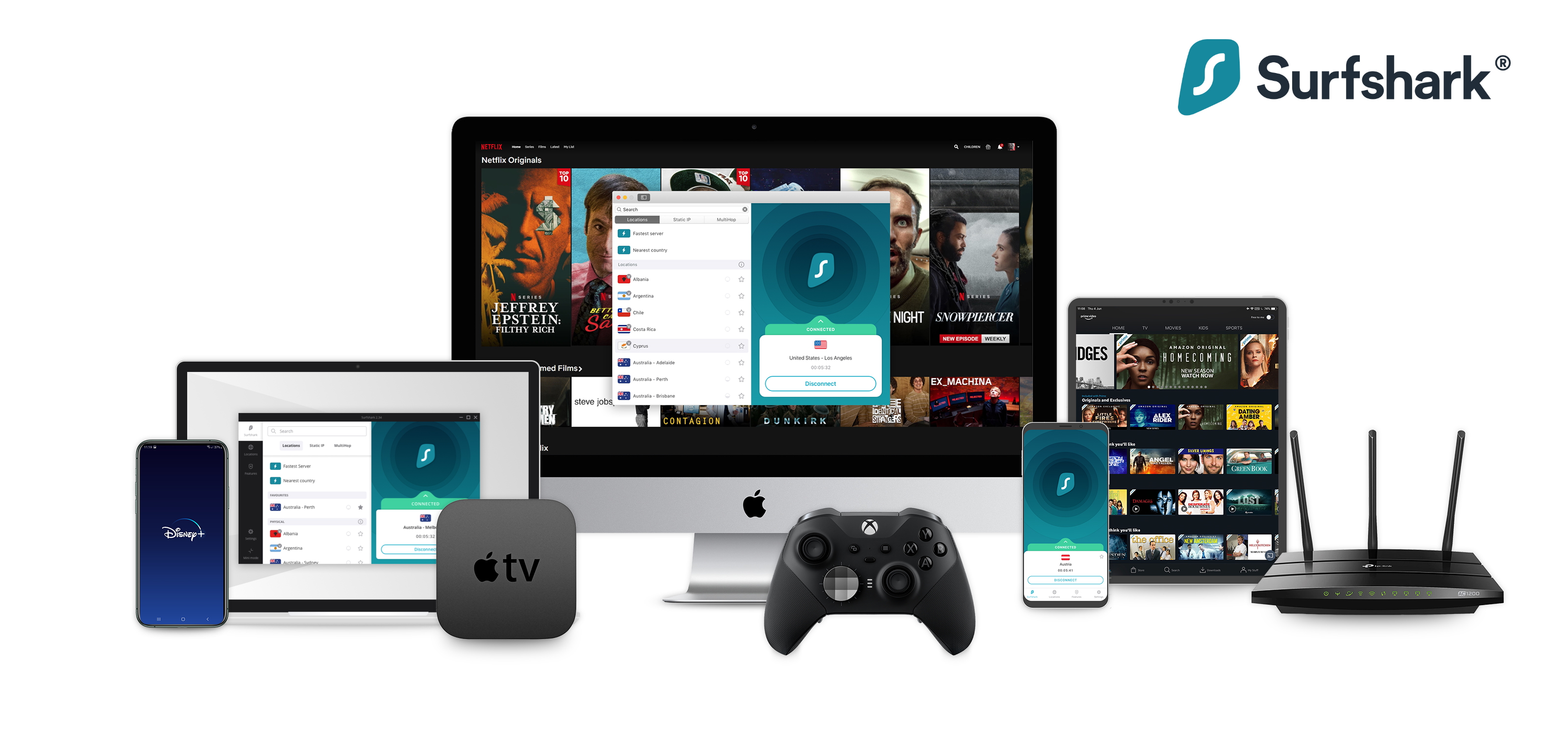
1. Surfshark
Today's fastest VPN – and the best budget-friendly prices
Surfshark’s fastest protocol, WireGuard, recorded speeds of 950+ Mbps during our most recent round of in-house testing (where we connected to a nearby UK-based server via a 1 GB line). This performance matches its previous score and highlights its consistency, and Surfshark’s newest speeds are ideal for data-intensive tasks like streaming, torrenting, and everyday browsing.
We tested Surfshark’s latency, too, which came in at 20.2 ms – almost good enough to be in the sub-20 ms golden zone that’s ideal for lag-free online gaming. Surfshark’s jitter (or lack thereof) was equally impressive. High jitter occurs when there's a delay in how long it takes for a data packet to travel across a network, and this can cause disruptions to streaming content, gaming, and video calls. So Surfshark's result of 4.36 ms meant that our streaming sessions didn’t encounter any issues with choppy audio or stuttering picture quality.
Read more about Surfshark ▼
However, it is worth noting that Surfshark’s latency and jitter results were the quickest in the morning – Surfshark’s jitter actually jumped to 35.9 ms when we repeated our tests in the evening. We believe this is why, when investigating Surfshark’s streaming capabilities, we experienced content failing to load later in the day, though we resolved the issue quickly enough by connecting to a different server.
Most VPNs struggle to maintain peak speeds when connecting to long-distance servers, but Surfshark’s performance didn’t drop off at all when we connected to the US from the UK, still recording speeds of over 950 Mbps. This is impressive and means that expats living abroad, or anyone on vacation, can connect to a server back home without worrying about the impact on their speeds.
Unfortunately, we did see a dip in Surfshark’s OpenVPN performance, which previously clocked in at an impressive 460 Mbps. Our most recent data puts OpenVPN at 460 Mbps, which is still quick for OpenVPN, especially considering how resource-intensive it is compared to WireGuard, and a better result than we saw from NordVPN, Proton VPN, and Mullvad.
In terms of streaming, Surfshark is one of the best Netflix VPNs available today. We found that content loaded quickly, in crisp high definition, aside from the handful of nighttime hiccups we mentioned earlier. Plus, Surfshark is able to unblock all popular platforms: Netflix, Prime Video, Disney+, and BBC iPlayer included.
The best VPN with antivirus
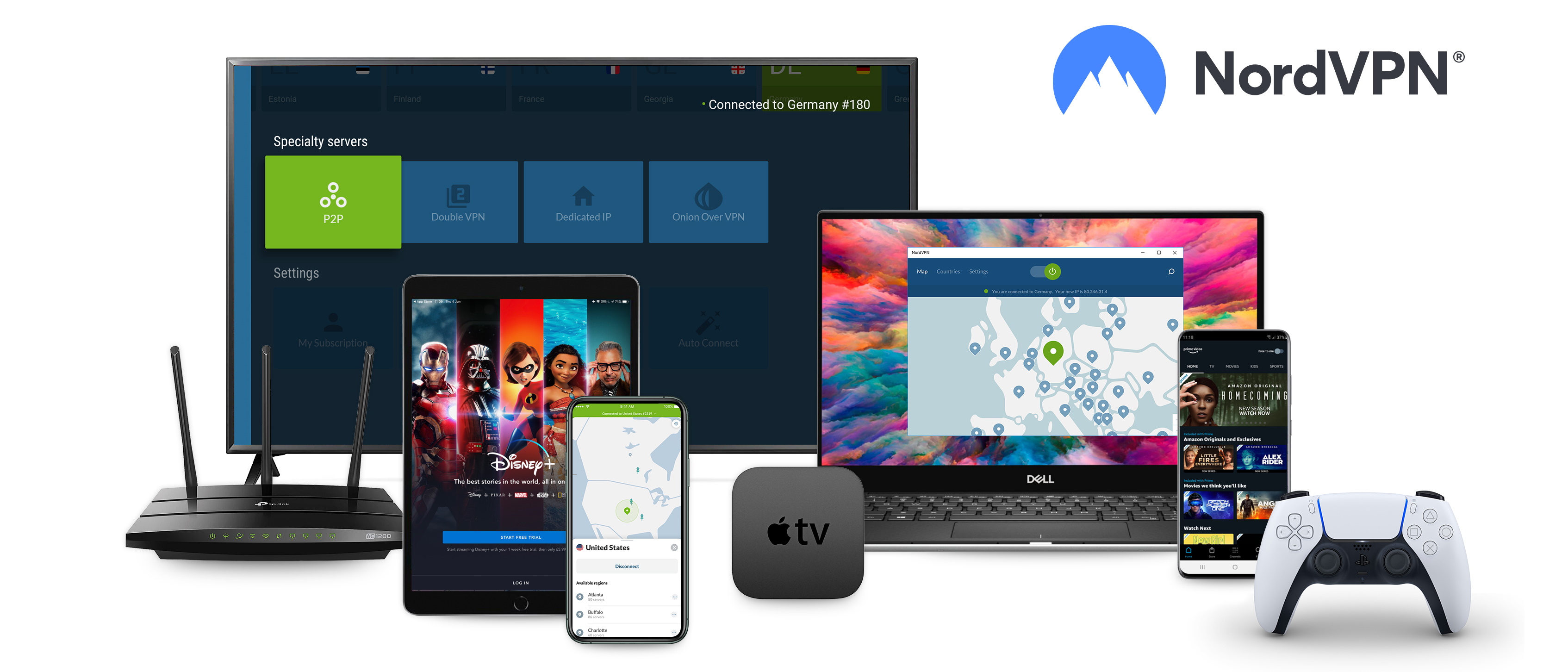

2. NordVPN
A solid all-rounder with speeds that really deliver
NordVPN matches Surfshark for speed, clocking in at 950+ Mbps using the NordLynx protocol – NordVPN’s proprietary and fastest option, based on WireGuard. We joined a local UK server to record this performance and, like Surfshark, we’re glad to see that NordVPN’s speeds haven’t dipped since the last time we tested it.
High latency can impact online gaming sessions, and anything below 20 ms is considered ideal, especially if you play competitive multiplayer titles. NordVPN recorded a latency of 19.5 ms, below this threshold, underscoring its position as the best gaming VPN on the market. Similarly, we saw jitter of just 4.18 ms, which won’t cause any rubber-banding (which happens when you're moving in one direction only to be suddenly snapped back to a previous location) or input delay while gaming, or audio and playback issues while streaming.
Read more about NordVPN ▼
We’re especially impressed with the speeds we saw when connecting to a US server from the UK, as NordVPN continued to hit 950+ Mbps. Considering that other premium VPNs (Surfshark aside) struggle to hit their top speeds over trans-Atlantic distances, NordVPN’s results are fantastic – meaning you won’t notice a huge impact on your performance when spoofing your location overseas.
NordVPN’s OpenVPN speeds have increased since the last time we tested them, jumping from 110 Mbps to 173 Mbps. This doesn’t rival its NordLynx performance, but OpenVPN scores rarely do (the protocol isn’t as lightweight), and we also noticed spikes in latency – hitting up to 100 ms at times. This means if you want to maximize your gaming or torrenting performance, you’ll want to stick with NordLynx.
The same is true for streaming, and when we used the protocol to tune in to Netflix, Prime Video, BBC iPlayer, and more, we didn’t encounter a single issue with buffering or stuttering picture quality. Plus, content loaded first time, every time - even when switching to the OpenVPN protocol.
The best VPN for privacy
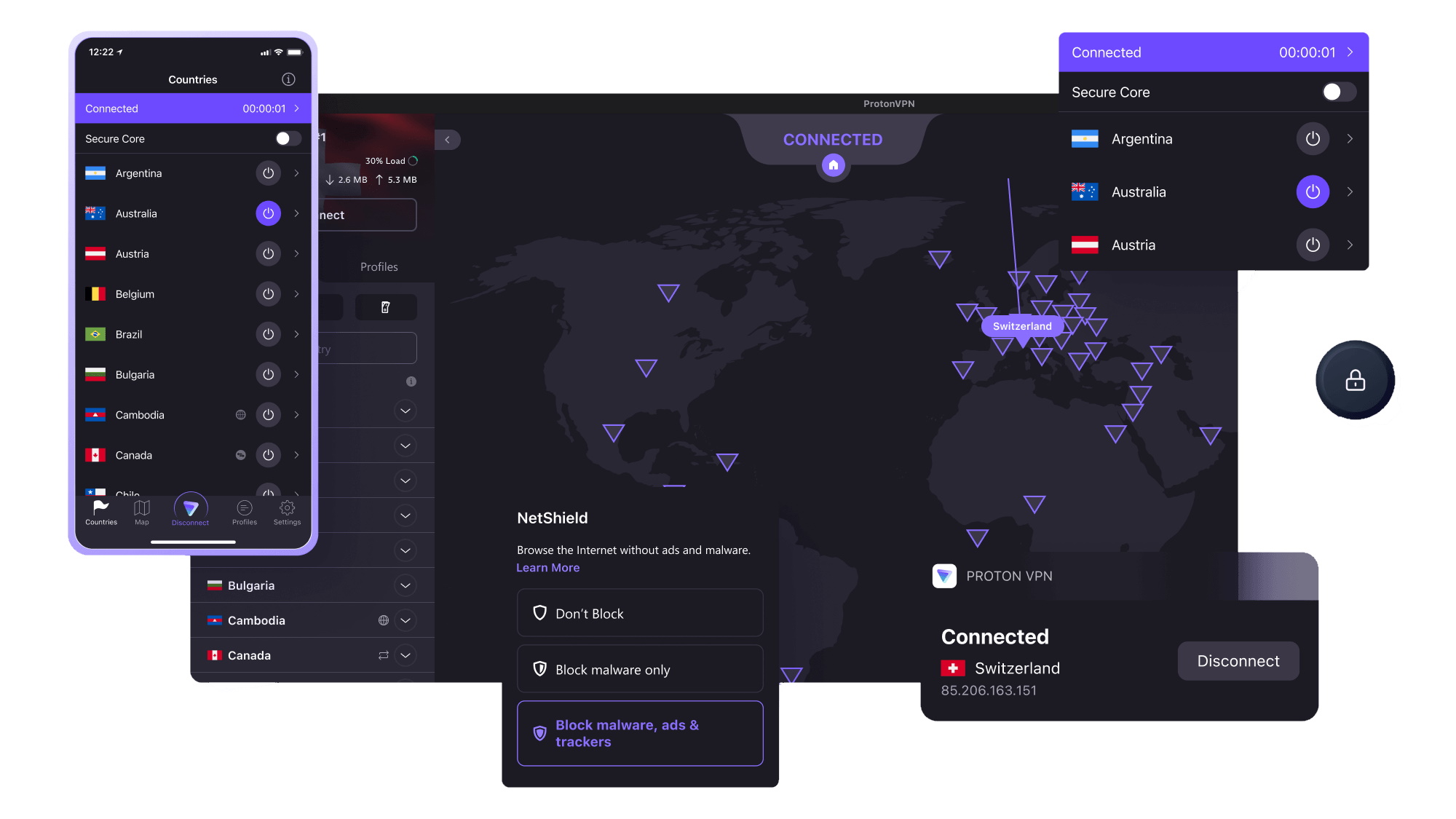
3. Proton VPN
A VPN that continues to advocate for internet freedom everywhere
Proton VPN joins Surfshark and NordVPN by achieving speeds of 950+ Mbps. We recorded these using the quickest available protocol, WireGuard, and using our 1 GB connection via a UK server. When we last put Proton VPN’s speeds to the test, they also clocked in at 950+ Mbps, which is encouraging consistency.
The latency and jitter we saw were comparable with our top two VPN picks, too, though we recorded better results in the morning. Latency came in at 19.6 ms, ideal for hopping into online games and video calls, which typically require under 20 ms for optimal performance free from hiccups. Jitter of 4.09 is particularly impressive, and less than Surfshark and NordVPN, which is no doubt why we didn’t run into any trouble with freezing or choppy playback when streaming with Proton VPN.
Read more about Proton VPN ▼
Proton VPN falls short when it comes to its long-distance speed results, however. When we connected to a US server from our base in the UK, its WireGuard performance fell to 630 Mbps. While this didn’t cause a noticeable impact in our browsing experience, it does mark a slight dip from previous trans-Atlantic speeds of 700 Mbps. If you’re looking for a super-fast VPN for travel (let's say you're headed to the US on vacation and leaving the UK behind, but still want to follow live Premier League matches the same way you would at home), you might be better off with NordVPN and Surfshark, both of which didn’t drop off when connecting to overseas servers.
Proton VPN’s OpenVPN speeds have also dropped. We recorded a performance of 220 Mbps, almost half of the 400 Mbps recorded previously, but this is still quicker than NordVPN, at 173 Mbps. If you need to switch to OpenVPN and benefit from its battle-tested security, perhaps while torrenting, Proton VPN is one of the best options in our guide.
We also put Proton VPN’s proprietary Stealth protocol to the test, seeing speeds of 403 Mbps, on par with its OpenVPN results. While slower than WireGuard, this is the range we expected to see for a privacy-focused protocol – and Stealth is designed to conceal your VPN traffic and evade VPN bans in privacy-unfriendly countries, and not necessarily for streaming HD and 4K content.
Luckily, switching to WireGuard with Proton VPN turns it into a great streaming VPN able to access all of the streaming platforms we threw at it. Content loaded as quickly as it does without a VPN, and we didn’t need to disconnect and reconnect to resolve any stuttering issues.
The best latency for gaming

4. CyberGhost
The best latency for gaming
CyberGhost may be fourth on our list, but its WireGuard speeds keep up with our first three picks, also coming in at 950+ Mbps. Like NordVPN and Surfshark, we’re glad to see that these speeds haven’t dipped since the last time we tested CyberGhost, and that it remains a reliable choice for streaming and online gaming, where you won’t want to be interrupted by buffering circles or lag spikes.
In terms of latency, CyberGhost recorded the lowest results of all of the VPNs on this list, at 11 ms, which is almost half the latency you’ll get from Surfshark (20.2) and NordVPN (19.5). Considering that most gamers peg latency under 20 ms as ideal for competitive titles and lag-free matches, CyberGhost is well worth considering if you regularly play online. While CyberGhost’s jitter wasn’t quite as impressive, recorded at 6.25 ms, it’s still within the range you’ll need for clear video calls and stutter-free streaming.
Read more about CyberGhost ▼
When we connected to a US server from our base in the UK, we noticed that CyberGhost’s WireGuard speeds dropped to 633 Mbps. This isn’t that unusual, as most VPNs find it difficult to maintain their peak speeds across large distances, but Surfshark and NordVPN achieved it, clocking in at 950+ Mbps regardless of whether we were connected to a UK or US server. This doesn’t mean CyberGhost isn’t a viable option, but if you’re looking for a super-fast VPN for travel (let's say you're headed to the US on vacation and leaving the UK behind, but still want to follow live Premier League matches the same way you would at home), you might be better off with either Surfshark or NordVPN.
It’s also worth noting that CyberGhost’s OpenVPN performance is the weakest of all our listed VPNs - though it’s not by much. We saw speeds of 165 Mbps with CyberGhost, and NordVPN is just ahead, at 173 Mbps. While slower than WireGuard, this is the range we expected to see for a privacy-focused protocol that most people won’t be using for streaming or gaming.
CyberGhost continues to impress us with its streaming capabilities, able to unblock Netflix, Prime Video, BBC iPlayer, and even 9Now and 10Play without issues. Using WireGuard, we didn’t encounter buffering issues or long load times.
We did have to wait an unusually long time when connecting and disconnecting to the CyberGhost Windows app, however, which is unusual, as VPNs utilizing the WireGuard protocol typically only take a fraction of a second to establish (and break) a connection. During our testing, we typically waited three seconds to connect to a server - though this sometimes rose to ten seconds when switching to OpenVPN - and disconnecting took anywhere from two to ten seconds, too. This issue won’t be a deal-breaker for most users, but it’s a frustration that just isn’t present in Surfshark’s offering, which connects and disconnects in the blink of an eye, every time.
A great free alternative
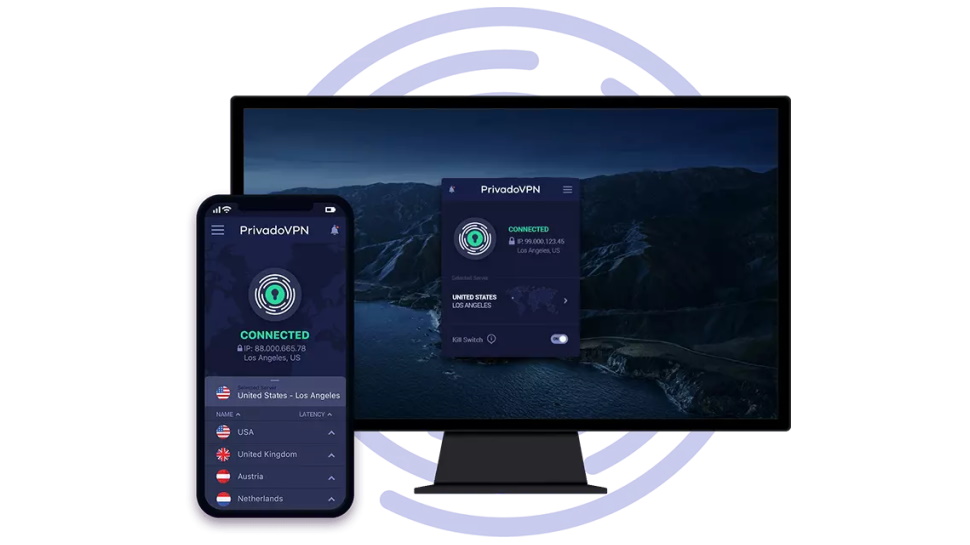
5. PrivadoVPN Free
A free VPN with a surprisngly speedy WireGuard performance
In addition to being the best free VPN, PrivadoVPN Free recorded unexpectedly quick speeds using the WireGuard protocol - clocking in at 950+ Mbps, maxing out our connection. Some paid providers struggle to match this performance, so PrivadoVPN Free’s presence at the tail end of our rankings is a surprise, but well-earned, and gives users looking for a quick free service a viable option to trial.
During our testing, we noticed a few oddities about PrivadoVPN Free and its paid counterpart, PrivadoVPN. For a start, the free service’s WireGuard speeds are quicker than the premium option (550 Mbps), and premium OpenVPN speeds are quicker, still (806 Mbps). This is unusual, as OpenVPN usually lags behind WireGuard, being more resource-intensive, and paid services typically have more resources to invest in their server networks, making them faster in most instances.
Read more about PrivadoVPN Free ▼
We believe that the variation in these results indicates that PrivadoVPN Free and PrivadoVPN performances both fluctuate a lot - and that PrivadoVPN Free might not always challenge the likes of Surfshark, NordVPN, and Proton VPN with identical WireGuard results. For the time being, it’s a quick, free service that’s more capable than other options, though users will need to ration their monthly data allowance in order to make the most of its performance.
As is the case with any free VPN, however, PrivadoVPN has its limitations, with the biggest being a monthly limit of 10 GB. However, unlike other free services (like Windscribe Free), PrivadoVPN Free won’t cut you off entirely if you reach this cap, and you’ll instead be allowed to continue using the service - albeit with speeds throttled to around 2 - 4 Mbps. Unfortunately, this is way less than the minimum 25 Mbps you’ll need to enjoy 4K content on Netflix, and barely enough for HD, which takes 2 - 5 Mbps..
Still, while you’re within your data allowance, its WireGuard speeds easily keep up with streaming and live content, video calls, and even torrenting. PrivadoVPN Free is also one of a handful of free VPNs that can actually unblock popular streaming services. We were able to tune into the US and UK Netflix libraries, Disney+, and BBC iPlayer. You’ll get more streaming support from the premium alternatives in this guide, however, particularly Surfshark and NordVPN, which unblocked the libraries PrivadoVPN Free couldn’t - including multiple Netflix libraries outside the States and Britain, Prime Video, and Australia’s 9Now and 10Play.
TechRadar's VPN speed rankings
Want to know the raw speeds that we discovered in our testing? Check out the table below where each provider is listed according to its US speed. You'll find some of our top performers, consistently quick providers, and a few newcomers who have shot through the ranks.
Remember, the table is based solely on speed, which is why curate providers that combine maximum performance, consistent speeds across regions and protocols, and other qualities in our countdown above.
VPN Provider | WireGuard or proprietary | OpenVPN |
|---|---|---|
1. Surfshark | over 950 Mbps (maxed out our testing) | 460 Mbps |
2. NordVPN | over 950 Mbps (maxed out our testing) | 173 Mbps |
3. Proton VPN | over 950 Mbps (maxed out our testing) | 220 Mbps |
4. CyberGhost | over 950 Mbps (maxed out our testing) | 165 Mbps |
5. PrivadoVPN Free | over 950 Mbps (maxed out our testing) | - |
6. ExpressVPN | 898 Mbps | 176 Mbps |
7. PrivadoVPN | 550 Mbps | 806 Mbps |
8. Windscribe | 785 Mbps | 365 Mbps |
9. Windscribe Free | 509 Mbps | - |
10. PIA | 436 Mbps | 257 Mbps |
How we test VPN services - our review methodology
The TechRadar team retests the industry’s top VPNs every six months – and calculating the speed of these providers is often the most time-consuming part of the process. It’s an important consideration, however, as a slow VPN that can’t keep up with streaming, gaming, torrenting, or even day-to-day browsing just isn’t worth using.
We ensure that VPNs are tested across an even playing field by using a Windows set-up and a 1 GB Ethernet-based connection. We combine at least three speed testing sites, test our normal connection speed with the VPNs switched off, and then, one by one, we enable the VPNs and record their performance. We repeat these tests at least five times throughout the day and take the median average as our result.
In terms of protocols, we test OpenVPN wherever it is available, along with WireGuard, or any proprietary protocol based on it. Think ExpressVPN’s Lightway or NordVPN’s NordLynx.
We’re aware that speeds can fluctuate based on the distance between our home base and the server location, too. So, while we test the speeds of the closest UK-based server, we’ll also record the performance of a VPN when connected to a US-based alternative to record the fairest representation of the provider’s performance.
You can read more about our full VPN testing methodology here.
Fastest VPN FAQs
Which VPN is fastest?
Surfshark is the fastest VPN with WireGuard speeds of 950+ Mbps. This far exceeds the 5 - 25 Mbps you need to enjoy smooth HD and 4K streaming content without worrying about buffering hiccups or a sluggish day-to-day browsing experience.
How to choose the fastest VPN
The best fast VPNs utilize the streamlined WireGuard protocol (though PrivadoVPN’s OpenVPN speeds actually beat its WireGuard performance), and achieved speeds of around 700 Mbps and above, as well as sub-20ms latency and jitter. Together, these results ensure smooth, bufferless streaming free from choppy image and audio problems, and lag-free online gaming. Speed isn’t the be-all-and-end-all of a good VPN, either, so don’t forget to check that the VPN has servers in nearby locations and apps for the devices you use.

Do VPNs make your internet slower?
VPN encryption renders your data unreadable to snoopers, but this does add extra steps to the process of connecting to the web, which can impact your overall speed. However, today’s best VPNs invest heavily in their infrastructure to ensure that this impact is as negligible as possible, and that you’ll barely notice that you’re connected to a VPN in the first place.
We test and review VPN services in the context of legal recreational uses. For example: 1. Accessing a service from another country (subject to the terms and conditions of that service). 2. Protecting your online security and strengthening your online privacy when abroad. We do not support or condone the illegal or malicious use of VPN services. Consuming pirated content that is paid-for is neither endorsed nor approved by Future Publishing.
Sign up for breaking news, reviews, opinion, top tech deals, and more.

River is a Tech Software Editor and VPN expert, helping take care of cybersecurity content on TechRadar, ranging from reviews, buying guides, and must-have VPN deals. River's expertise in the cybersecurity field opened their eyes to the startling amount of online snooping we accept into our daily lives. Now, River is committed to fighting for your right to digital privacy by shining a light on its biggest threats – and helping readers safeguard their data with the help of a VPN. Surfshark is River's favorite VPN, and they use it every day to keep their most sensitive details out of the hands of third-party trackers.
- Rob DunneVPN Editor


